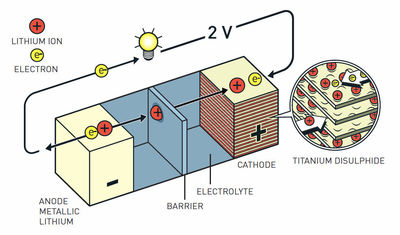Nobel prize awarded to inventors of Li-ion battery

The Nobel Prize in Chemistry 2019 has been awarded to the developers of the lithium-ion battery: John B Goodenough, Stanley Whittingham and Akira Yoshino.
Lithium-ion batteries are used globally to power the portable electronics that we use to communicate, work, study, listen to music and search for knowledge. Lithium-ion batteries have also enabled the development of long-range electric cars and the storage of energy from renewable sources, such as solar and wind power.
The foundation of the lithium-ion battery was laid during the oil crisis in the 1970s. Stanley Whittingham worked on developing methods that could lead to fossil fuel-free energy technologies. He started to research superconductors and discovered an extremely energy-rich material, which he used to create an innovative cathode in a lithium battery. This was made from titanium disulfide which, at a molecular level, has spaces that can house — intercalate — lithium ions.
The battery’s anode was partially made from metallic lithium, which has a strong drive to release electrons. This resulted in a battery that literally had great potential, just over two volts. However, metallic lithium is reactive and the battery was too explosive to be viable.
John Goodenough predicted that the cathode would have even greater potential if it was made using a metal oxide instead of a metal sulfide. After a systematic search, in 1980 he demonstrated that cobalt oxide with intercalated lithium ions can produce as much as four volts. This was an important breakthrough and would lead to much more powerful batteries.

With Goodenough’s cathode as a basis, Akira Yoshino created the first commercially viable lithium-ion battery in 1985. Rather than using reactive lithium in the anode, he used petroleum coke, a carbon material that, like the cathode’s cobalt oxide, can intercalate lithium ions.
The result was a lightweight, hardwearing battery that could be charged hundreds of times before its performance deteriorated. The advantage of lithium-ion batteries is that they are not based on chemical reactions that break down the electrodes, but on lithium ions flowing back and forth between the anode and cathode.
Lithium-ion batteries have revolutionised our lives since they first entered the market in 1991. They have laid the foundation of a wireless, fossil fuel-free society, and are of the greatest benefit to humankind.
Australian industry contracts in F-35 program worth over $5 billion
The Department of Defence has announced that Australian industry has reached a milestone of more...
Mitsubishi and Rio Tinto to participate in hydrogen-based ironmaking
Mitsubishi, Rio Tinto, Primetals (UK) and voestalpine (Austria) are collaborating on a...
Greensteel Australia to build next-generation steel mill
Greensteel Australia has announced it has placed an order to purchase equipment for its...








